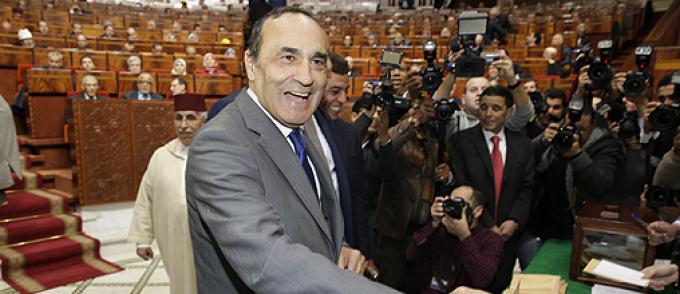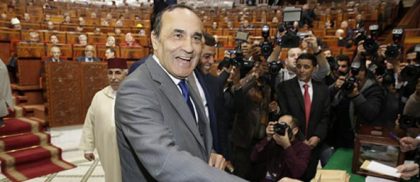
Election of Parliament Speaker Complicates Benkirane’s Bid to Form Coalition
 Leftist MP Habib El Malki of the USFP party was elected Monday Speaker of the Lower House of Parliament amid fears that such a decision may further complicate the stalling formation of a coalition government by Abdelilah Benkirane, Secretary General of the Islamist PJD party.
Leftist MP Habib El Malki of the USFP party was elected Monday Speaker of the Lower House of Parliament amid fears that such a decision may further complicate the stalling formation of a coalition government by Abdelilah Benkirane, Secretary General of the Islamist PJD party.
Benkirane was appointed Head of Government by King Mohammed VI after his party came in first in the October 7 general elections with 125 seats, but his talks with other parties to form a coalition government have so far been fruitless.
Malki, 71 year-old, was elected by MPs from opposition parties with 197 votes in favor, while 137 blank votes were submitted by the 125 PJD lawmakers and their leftist PPS party ally, which holds 12 seats in Parliament. The 47 MPs of the conservative PI party abstained from the vote and 7 other votes were declared invalid.
The USFP candidate received the votes of lawmakers from the liberal parties: the PAM, RNI and the UC.
The election of the House of Representatives Speaker before the formation of the governmental coalition risks further complicating negotiations between Benkirane and other political party leaders. The election of the Parliament Speaker was speeded up in view of the need to adopt texts relating to Morocco’s bid to join the African Union.
Over the next two days, the House of Representatives will forge ahead with the election of the deputy speakers and heads of parliamentary committees.
PJD leader and coordinator at the House of Representatives, Saad Eddine EL Othmani, described the blank vote as reflective of the party’s willingness to overcome the current deadlock. That is to say, the PJD seeks not to take stands against the USFP candidate leaving the door open for a potential coalition with other parties.
EL Othmani told his party’s news portal that the PJD has decided to submit a blank vote in order to enable the smooth election of the Lower House Speaker in order to clear the way for Morocco’s return to the African Union. By casting a blank vote and not appointing a candidate, the PJD avoided a situation by which its electoral victory would appear as pointless.
Morocco is in an unprecendented political deadlock after Benkirane broke off talks to form a new government with two main coalition partners three months after the country’s elections.
Two Royal Advisors , Abdellatif Mennouni and Omar Kabbaj, met with Benkirane at the end of December and expressed to him the concern of the Sovereign regarding the delay in forming the new government. Soon after that, the PJD said that the PI will not be part of the next government in a bid to overcome the deadlock and forge ahead with negotiations.
After five years in government, the PJD won 125 seats in October’s election followed by its archrival the Authenticity and Modernity Party (PAM) with 102 seats, while the conservative PI won 46 seats.
The fragmentation of Morocco’s political landscape makes no party able to win an outright majority. To secure the majority of seats needed to form a coalition government, the PJD has at least to enter into a coalition with 4 parties, a task that may put the PJD on a rocky road to negotiate the distribution of ministerial portfolios and compromise on their party’s policy to bring it in tandem with its partners in the future government.
With 12 parties represented in the lower house, the Moroccan stalemate indicates how too many parties can spoil politics giving way to incoherent governmental coalitions involving odd bedfellows including Islamists, former communists and conservatives as was the case with the previous government.
